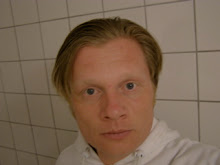Nogle mennesker kunne lige så leve i et diktatur som i vesten for de udsættes for præcist samme behandling - underlagt små minityranner, som ikke burde gå frit omkring, som Theodore Dalrymple så rammende skriver:
In Central America, I witnessed civil war fought between guerrilla groups intent on imposing totalitarian tyranny on their societies, opposed by armies that didn't scruple to resort to massacre. In Equatorial Guinea, the current dictator was the nephew and henchman of the last dictator, who had killed or driven into exile a third of the population, executing every last person who wore glasses or possessed a page of printed matter for being a disaffected or potentially disaffected intellectual. In Liberia, I visited a church in which more than 600 people had taken refuge and been slaughtered, possibly by the president himself (soon to be videotaped being tortured to death). The outlines of the bodies were still visible on the dried blood on the floor, and the long mound of the mass grave began only a few yards from the entrance. In North Korea I saw the acme of tyranny, millions of people in terrorized, abject obeisance to a personality cult whose object, the Great Leader Kim Il Sung, made the Sun King look like the personification of modesty.Og så dagens manglende frontallap historie:Still, all these were political evils, which my own country had entirely escaped. I optimistically supposed that, in the absence of the worst political deformations, widespread evil was impossible. I soon discovered my error. Of course, nothing that I was to see in a British slum approached the scale or depth of what I had witnessed elsewhere. Beating a woman from motives of jealousy, locking her in a closet, breaking her arms deliberately, terrible though it may be, is not the same, by a long way, as mass murder. More than enough of the constitutional, traditional, institutional, and social restraints on large-scale political evil still existed in Britain to prevent anything like what I had witnessed elsewhere.
Yet the scale of a man's evil is not entirely to be measured by its practical consequences. Men commit evil within the scope available to them. Some evil geniuses, of course, devote their lives to increasing that scope as widely as possible, but no such character has yet arisen in Britain, and most evildoers merely make the most of their opportunities. They do what they can get away with.
In any case, the extent of the evil that I found, though far more modest than the disasters of modern history, is nonetheless impressive. From the vantage point of one six-bedded hospital ward, I have met at least 5,000 perpetrators of the kind of violence I have just described and 5,000 victims of it: nearly 1 percent of the population of my city—or a higher percentage, if one considers the age-specificity of the behavior. And when you take the life histories of these people, as I have, you soon realize that their existence is as saturated with arbitrary violence as that of the inhabitants of many a dictatorship. Instead of one dictator, though, there are thousands, each the absolute ruler of his own little sphere, his power circumscribed by the proximity of another such as he.
Violent conflict, not confined to the home and hearth, spills out onto the streets. Moreover, I discovered that British cities such as my own even had torture chambers: run not by the government, as in dictatorships, but by those representatives of slum enterprise, the drug dealers. Young men and women in debt to drug dealers are kidnapped, taken to the torture chambers, tied to beds, and beaten or whipped. Of compunction there is none—only a residual fear of the consequences of going too far.
Perhaps the most alarming feature of this low-level but endemic evil, the one that brings it close to the conception of original sin, is that it is unforced and spontaneous. No one requires people to commit it. In the worst dictatorships, some of the evil ordinary men and women do they do out of fear of not committing it. There, goodness requires heroism. In the Soviet Union in the 1930s, for example, a man who failed to report a political joke to the authorities was himself guilty of an offense that could lead to deportation or death. But in modern Britain, no such conditions exist: the government does not require citizens to behave as I have described and punish them if they do not. The evil is freely chosen.
Sigtelserne lyder på vold, ulovlig tvang, frihedsberøvelse og afpresning. Episoden fandt sted natten til søndag, da den 19-årige mand kørte i sin bil på Hundige Bygade i Greve Kommune. Klokken 02.00 dukkede seks personer op og kastede offeret ned i bagagerummet på sin egen bil.Hvilken tiltro til egen magt til at skræmme, at tro de ikke ville blive mødt af politiet.Mændene kørte lidt rundt i området og endte på Hundige Strand, hvor de tvang den 19-årige mand til at smide tøjet. De slog og sparkede den nøgne mand, og en af gerningsmændene stak en pistol op i munden på offeret. Efter to timers frihedsberøvelse slap mændene den 19-årige mand fri, men krævede samtidig, at han betalte dem 100.000 kroner.
Senere søndag dukkede mændene op på Borups Allé i København for at hente første afdrag af de 100.000 kroner. Men offeret havde i mellemtiden kontakten politiet, så alle seks mænd blev anholdt.
Det værste er, at hvis du ikke vil finde dig i en sådan behandling, risikerer du selv at bliver dømt.
Er du blandt de uheldige, som bliver udvalgt af psykopater, som disse her. Lever du i et dobbelt diktatur, du er magtesløs og må ikke selv bruge magt, fanget mellem ondskaben og staten.



0 kommentarer:
Send en kommentar